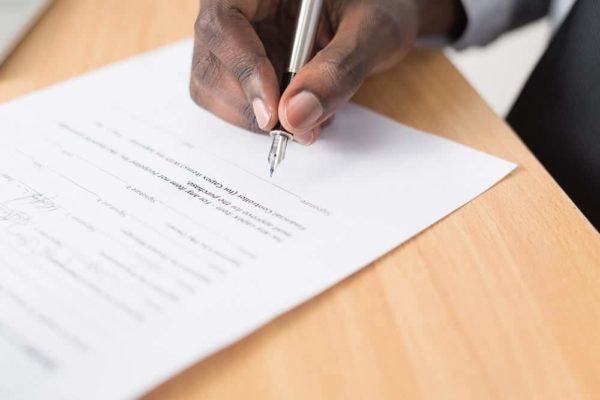Everyone needs to have a will. While you might think of writing a last will and testament as something only important for the wealthy, or those with children, this is not the case. Even if you only have a few meagre possessions and don’t own a property, leaving a will helps your loved ones to get your affairs in order when you pass. People often don’t know what to do when a loved one passes away, and so leaving a clear will can help them through a dark time.
It’s a common misconception that writing a will and testament is overly complicated, or that it requires hiring an expensive notary or solicitor. This is not the case. If your assets and bequests are fairly straightforward, it is reasonably straightforward to create your own will that will stand up in court.[i] This will allow the government and/or your loved ones to execute your wishes with as much ease as possible. There are two common ways to draft your own will: write it in a document on your computer or even by hand, or use an online programme designed to help you through the process.
Why do you need a will?
There is a wide array of reasons why you need to create a will. You might be reluctant to think about this inevitability; after all, no one likes to think about their own death. However, even if you have only a few possessions and no dependents, it is important that you make a will for some of the following reasons:
- Without a will, certain strict rules will be followed – The government has strict rules that will dictate how your money, property, and possessions will be allocated in the event that you do not have a will. This means that your belongings and assets could be distributed in ways that you do not wish. In particular, any unmarried partners or stepchildren will be left out of your inheritance.
- Your children and grandchildren could be left out – If you have children with different partners, or you have stepchildren, they could be completely left out. Similarly, if you wish for a different relative or friend (such as nieces and nephews, or godchildren) to receive your belongings, this needs to be enshrined in a will.
- Your new partner could be left out – Similarly, even if your romantic partnerships have changed, your ex-husband or wife could still automatically inherit your assets. Did you know that, despite common usage, there is actually no such status as ‘common law’ in the UK?[ii] Your new partner could be left out, even if you are in a ‘common-law’ relationship with them.
- Without a will, your benefactors might pay higher taxes – Certain inheritance taxes can be mitigated or reduced if you take advice from experts (or online programmes) in advance and if you create a will.[iii]
What happens if you pass without a will?
If you pass away without leaving a will behind, your property, possessions, and assets will be divvied up according to UK rules. You will be considered an ‘intestate person’ – that is, someone who has died without leaving a will. According to the rules of intestacy, your closest relatives and legal spouse will automatically inherit your estate, regardless of your wishes.[iv] Your assets might be more heavily taxed than if you had left a will.
In the case that you do not have a will, your spouse or civil partner will automatically inherit all of your personal belongings, and then the first £250,000 of your assets.[v] It does not matter if you are divorced or have split up and have a new partner – your ex will be treated as your spouse unless your will removes this relationship, or you have remarried. Your children will be entitled to half of all money in addition to £250,000. If you have no spouse or children, your estate will go to your parents, siblings, or nieces/nephews.
Step by step guide to writing a will
Step 1 – Value your estate
In order to write an accurate and useful will, you need to take accurate stock of your possessions and get an idea of what it is worth. Do this by creating a list of your assets and your debts. Your assets could include:
- Your home and properties
- Your savings and bonds
- Life insurance policies
- Pension funds that pay out a lump sum on death
- Investments, including stocks and shares
- Vehicles
- Household contents
- Jewellery, art, antiques, and other heirlooms
- Things of sentimental value
Your debts could include:
- Your mortgage
- Credit card debt
- Loans
Step 2 – Determine how you would like to divide your estate
At this point, it is extremely important that you think carefully about who you want to leave your assets and possessions to when you die. Be very, very clear, and leave no room for nuance or confusion. Use clear, simple language.
Some things to consider include:
- Who do you want to benefit the most?
- Do you want to leave sentimental items to specific people?
- Do you wish to leave a gift for a charity or organisation?
- How much you want to spend on your funeral arrangements?
- Do you want to set up trusts for children to access when they reach 18?
Step 3 – Choose your executor
Your executor will be the person responsible for overseeing the distribution of your estate. Some people choose their spouse or one of their children, while others prefer to appoint someone a step removed from their family. You must tell your executor of your intentions to appoint them.
Step 4 – Writing your will
The following are common options for people writing their wills:
- Lawyers: Speaking to a solicitor or chartered legal executive is a good idea when making a will. They can provide advice, or write the will on your behalf. Ensure that they are licensed, and have experience writing wills.
- Professional will writers: Professional will-writers (such as those who belong to the Institute of Professional Willwriters) can be a great help.
- Charities: If you are struggling to pay for the costs of a lawyer or professional, consult with local charities to see if they provide these services. Will Aid and Free Wills Month are both good resources.
- Banks: Your bank might offer will-writing services and estate planning as one of their services. Ensure that their fees are competitive before you go this route.
- Writing your own will: In order to write your own will, you need to ensure that you follow the advice in this article. You might want to seek professional advice before diving into the task.
Step 5 – Sign your will with 2 witnesses present
Sign your will in the presence of 2 independent witnesses. They should not be benefactors named in your will.
Step 6 – Keep your will in a safe place, and advise your executors
If no one can find your will upon your death, it won’t do much good! You can store it with your solicitor (if you use one), in a bank safety deposit box, stored safely in your home, or you can leave it with the Probate Service.[vi] Let your executors know where you have stored it.
How do you ensure your will is valid?
In order to ensure that your will is valid and will be honoured when you pass away, you must ensure that you do the following:
- Your will needs to be in writing (not a verbal recording or in video form)
- It must start with the statement that it revokes all previous versions.[vii] If you have ever made a will in the past, you should destroy it/them
- You must sign your will in the presence of 2 witnesses.[viii] They should not be beneficiaries named in your will
- You must have the mental capacity to understand the effects of your actions
- It must be voluntary, and you must not have been coerced or pressured by anyone else to write it
How do you make changes to your will?
At different times in your life, you might need to make changes to your will. Children are born, relationships end, and life circumstances change. As a result, you should review your will regularly, at least every 5 years.
If you need to make a small adjustment to your will, it’s fairly straightforward to add a codicil (a minor amendment).[ix] You will need two witnesses, but they do not need to be the same as the witnesses who signed the original will. Do not attach amendments or changes with staples or paperclips, as these can go missing. Similarly, do not use any paperclips or staples on your will at all. If they detach and leave any marks, it can raise questions about potential missing information.
If you need to make major changes, you should rewrite your will following all of the steps listed above, including signing it in the presence of two witnesses. Remember – divorce does not invalidate your previous will (but marrying, remarrying, or entering a new civil partnership does). Always create a new will whenever your serious relationship ends, or when you remarry.
Creating a will is easier than you might think
Don’t put this task off – creating a will now will save your loved ones a lot of headaches (and potentially money) when you pass away. Ensure they are taken care of, and improve your own peace of mind.
Reference list
Antoniou, J. (2018). Is a Homemade Handwritten Will Legal in England & Wales? | Co-op Legal. [online] Co-oplegalservices.co.uk. Available at: https://www.co-oplegalservices.co.uk/media-centre/articles-may-aug-2018/is-a-homemade-handwritten-will-legal/ [Accessed 21 Jan. 2020].
Citizensadvice.org.uk. (2019). Living together and marriage: legal differences. [online] Available at: https://www.citizensadvice.org.uk/family/living-together-marriage-and-civil-partnership/living-together-and-marriage-legal-differences/.
Fahy, D. (2019). The 10 best ways to avoid inheritance tax – Money To The Masses. [online] Moneytothemasses.com. Available at: https://moneytothemasses.com/tax/inheritance-tax/the-10-best-ways-to-avoid-inheritance-tax [Accessed 21 Jan. 2020].
Government Digital Service (2011). Making a will. [online] GOV.UK. Available at: https://www.gov.uk/make-will/updating-your-will [Accessed 21 Jan. 2020].
GOV.UK. (2016). Intestacy – who inherits if someone dies without a will? [online] Available at: https://www.gov.uk/inherits-someone-dies-without-will [Accessed 21 Jan. 2020].
HM Courts & Tribunals Service (2011). How to deposit a will with the Probate Service: a guide for people who want to deposit a will for safekeeping (PA7). [online] GOV.UK. Available at: https://www.gov.uk/government/publications/how-to-deposit-a-will-with-the-probate-service-a-guide-for-people-who-want-to-deposit-a-will-for-safekeeping-pa7 [Accessed 21 Jan. 2020].
Legalwills.co.uk. (2020). U.K. Legal Wills. [online] Available at: https://www.legalwills.co.uk/signingawill [Accessed 21 Jan. 2020].
Moneyadviceservice.org.uk. (2020). Sorting out the estate when there isn’t a will. [online] Available at: https://www.moneyadviceservice.org.uk/en/articles/sorting-out-the-estate-when-there-isnt-a-will [Accessed 21 Jan. 2020].
Randolph, M. (2015). How to Tell if a Will Was Revoked or Replaced. [online] www.alllaw.com. Available at: https://www.alllaw.com/articles/nolo/wills-trusts/how-tell-if-will-was-revoked-replaced.html [Accessed 21 Jan. 2020].
Resources
[i] https://www.co-oplegalservices.co.uk/media-centre/articles-may-aug-2018/is-a-homemade-handwritten-will-legal/
[ii] https://www.citizensadvice.org.uk/family/living-together-marriage-and-civil-partnership/living-together-and-marriage-legal-differences/
[iii] https://moneytothemasses.com/tax/inheritance-tax/the-10-best-ways-to-avoid-inheritance-tax
[iv] https://www.gov.uk/inherits-someone-dies-without-will
[v] https://www.moneyadviceservice.org.uk/en/articles/sorting-out-the-estate-when-there-isnt-a-will
[vi] https://www.gov.uk/government/publications/how-to-deposit-a-will-with-the-probate-service-a-guide-for-people-who-want-to-deposit-a-will-for-safekeeping-pa7
[vii] https://www.alllaw.com/articles/nolo/wills-trusts/how-tell-if-will-was-revoked-replaced.html

